Drug Rehab & Alcohol Rehab in Lincolnshire & near Lincolnshire
Quick links for drug rehab and alcohol rehab in Lincolnshire
- Is Drug and Alcohol Rehab Treatment Accessible in Lincolnshire or near Lincolnshire Through the NHS?
- How Do I Know If I Need Drug Rehab and Alcohol Rehab in Lincolnshire or near Lincolnshire?
- What is Drug Rehab and Alcohol Rehab in Lincolnshire or near Lincolnshire Like?
- What Types of Addictions Are Treated At Drug Rehab and Alcohol Rehab in Lincolnshire & near Lincolnshire?
- What is Inpatient Drug and Alcohol Rehab in Lincolnshire & near Lincolnshire?
- What is Outpatient Drug and Alcohol Rehab in Lincolnshire & near Lincolnshire?
- How Effective is Lincolnshire Rehab in Treating Alcohol or Drug Addictions?
- What Are the Alternatives to Going to Drug Rehab and Alcohol Rehab in Lincolnshire or near Lincolnshire?
- What is the Admissions Process for Drug and Alcohol Rehab in Lincolnshire or near Lincolnshire Like?
- How Can I Convince a Loved One to Access Drug Rehab and Alcohol Rehab in Lincolnshire?
Rehab centres in Lincolnshire are dedicated to helping those with alcohol or drug issues and medics, support staff and volunteers assist the clients to leave the centre healthy and invigorated.
These elegant detox clinics are located within, throughout and near to Lincolnshire.
Established clinics dedicated solely to addiction treatments have the experienced, professional staff have the clinical knowledge to help, guide and support individuals from the moment they arrive.
Following admission to a drug and alcohol rehab in Lincolnshire, a carefully monitored medically assisted alcohol or drug detoxification is conducted by a nursing team that is on duty 24 hours a day.
An individual therapeutic programme is then discussed and coordinated with the addiction counselling team to help the individual break their psychological addiction and habits.
Drug and alcohol rehab centres in Lincolnshire have been carefully designed and furnished to create a tranquil and supportive environment.
The excellent facilities they offer enable individuals to concentrate on the therapeutic side of their drug and alcohol rehab treatment, which is so important for their ongoing personal well-being.
What Makes People Turn to Drugs and Alcohol?

Woman looking in a mirror at a drug and alcohol rehab in Lincolnshire
Trauma, peer pressure, stress, being exposed to drugs at a young age, and how your parents raised you are all key factors that increase the likelihood of drug and alcohol abuse.
Findings as part of a study by professor of Genetics & Genomic Sciences Alison Goate discovered a higher usage of drugs and alcohol in people who have the gene CHRM2 (muscarinic cholinergic receptor 2).
What Impacts Can Drug and Alcohol Addictions Have on a Person?
Addiction is a disease that affects the brain’s activity to make responsible decisions and introduces issues.
It causes a person to live in survival mode.
With this comes the action of using the substance in order to manage the stressor which in the case of addiction is the withdrawal period.
In North Lincolnshire alone between 2019-2020, 495 people entered drug and alcohol rehab treatment for drug or alcohol addiction. Unfortunately, for many, living with addiction becomes an impossible way of life and can lead to exhaustion, feelings of low self-worth, loneliness and suicidal thoughts.
The following crime statistics indicate just how severe the need for effective drug and alcohol rehab in Lincolnshire is:
| Drug and Alcohol Crime Statistics in Lincolnshire (2022 – 2023) | Value |
|---|---|
| Annual Crime Rate | 2.1 crimes per 1000 workday people |
| Crime Rate in Lincolnshire Compared to National | 76% |
| Drug and Alcohol Crime Percentage | 2.1% |
| Total Drug and Alcohol Crimes in Lincolnshire | 600 |
| Year-over-Year Increase in Drug and Alcohol Crimes in Lincolnshire | 20.2% |
| Drug and Alcohol Crime Rate in Lincolnshire | 2.1 crimes per 1,000 working people per annum |
| Rank in England and Wales’ Postcode Areas | 33 out of 99 postcode areas |
This is why entering drug and alcohol rehab treatment is essential.
You can read more about the disease of addiction here.
Start your recovery journey at a drug or alcohol rehab in Lincolnshire today by calling our expert team on 0800 088 66 86
What If I Suffer From Multiple Conditions Alongside Addiction at Drug & Alcohol Rehab in Lincolnshire?

Two people walking through a forest during outdoor therapy at a drug and alcohol rehab in Lincolnshire
A dual diagnosis is actually quite common at drug and alcohol rehab and in the area of addiction in general.
It’s where a psychiatrist identifies that the person with addiction also has a mental health problem.
Often, it’s the underlying mental health of a person which will underpin the development of an addiction.
Many people use substances in order to regulate thoughts, feelings, and symptoms related to ill mental health. Where this continues, reliance on the substance can follow.
If you haven’t already been diagnosed with a mental health problem, this might happen during the psychiatric assessments you undergo during the admissions process at drug and alcohol rehab in Lincolnshire. It’s really important that you answer questions honestly and are upfront about things.
If you’re given a dual diagnosis, doctors are then better able to match you to the best rehab treatments to support your recovery for both conditions.
A person with a dual diagnosis will likely need a little more time and input from professionals.
This makes a huge amount of difference in creating a solid basis for future healing.
Many organisations across the UK offer free mental health support, whether you are also suffering from addiction or not.
Some of these include Mind UK, Young Minds, Rethink Mental Illness, Samaritans and Papyrus.
Discover how a drug and alcohol rehab in Lincolnshire will help to support your mental health needs by 0800 088 66 86
How Do I Know When I Need Drug Rehab & Alcohol Rehab in Lincolnshire or near Lincolnshire?

Older woman leaning on her hand at a drug and alcohol rehab clinic in Lincolnshire
Many people with addictions will say that they want to get control of the way they use substances but do not want to stop.
Sadly, what this suggests is that the person doesn’t totally understand how addiction works in the long run, despite being expert on how it affects them in the present moment.
Addiction lasts a lifetime. When people leave a drug rehab and alcohol rehab clinic in Lincolnshire, they can be filled with confidence, which is great, but sometimes this can lead them to be overconfident in their ability to remain sober.
This can lead them to see friends or go to places they used to use and this is often how people relapse.
In order to conquer drug or alcohol addiction, abstinence is the answer. A stay at a drug and alcohol rehab centre in Lincolnshire will support you through a safe withdrawal and will get you sober.
It will also give you the tools to remain sober if you use them and stick to your relapse prevention plan.
Many experts have agreed that abstinence is far more effective than harm reduction or moderation management – as a result, that’s what drug and alcohol rehab centres in Lincolnshire and beyond focus on.
Achieve abstinence and make sure you maintain it with the help of a drug and alcohol rehab in Lincolnshire – give our team a call today on 0800 088 66 86
Is Drug Rehab and Alcohol Rehab Accessible in Lincolnshire Through the NHS?
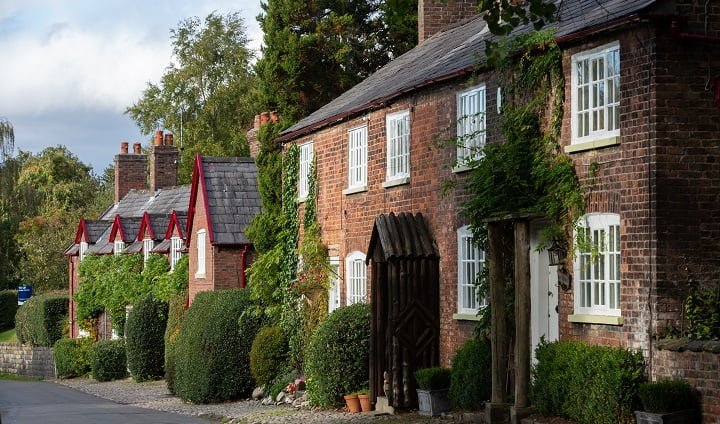
Outdoor image of a drug and alcohol rehab clinic in Lincolnshire
If you use drugs or alcohol in a controlled way or require light support and guidance, perhaps harm reduction techniques, then government-funded drug and alcohol rehab services in Lincolnshire are very useful.
They offer 12-step support groups that are also useful if you’ve been through drug and alcohol rehab in Lincolnshire and want somewhere free and easy to get to locally.
These focus on the concept of a higher power,although this does not necessarily have to be spiritual or religious in nature.
They also might offer some one-to-one sessions with substance misuse workers and specialists in Lincolnshire.
Free and NHS-run drug and alcohol rehab services in Lincolnshire and near Lincolnshire include:
1. CAMHS Lincoln
Address: Sycamore Centre, Beacon Lane, Grantham, NG31 9DF
Telephone: 0303 123 4000
2. We Are With You
Address: 26-30 Newland, Lincoln, LN1 1XG
Telephone: 0800 304 7021
Website: https://www.wearewithyou.org.uk/
3. Connect to Support – Lincolnshire
Telephone: 0300 303 8789
Website: https://lincolnshire.connecttosupport.org/
Private drug and alcohol rehab clinics in Lincolnshire offer an immersive experience and 24-hour care to people with severe addictions who need to achieve sobriety.
There are daily therapies and group sessions at drug and alcohol rehab to support you through the first few weeks of recovery.
You can find additional support from organisations such as Alateen, Change Grow Live and a local NHS Foundation Trust.
For help choosing between private and public drug and alcohol rehab clinics in Lincolnshire, talk it over with our expert team on 0800 088 66 86
How Do I Know If I Need Drug Rehab and Alcohol Rehab in Lincolnshire or near Lincolnshire?

Black and white photo of a couple holding hands at a drug and alcohol rehab centre in Lincolnshire
Going to drug and alcohol rehab in Lincolnshire isn’t suited to every person who uses alcohol and drugs. It’s for those with a moderate to severe addiction.
You can call Rehab Recovery for a discussion about your drug or alcohol use. This will help you decipher whether your use is at the level that requires input from a drug and alcohol rehab clinic in Lincolnshire.
For some, however, rehab is essential.
- Drinking more than 30 units of alcohol a day.
- Use more of the substance than you used to in order to get an effect.
- Losing control of how you use and used in dangerous ways put you and others at risk of harm.
- Using a lot of many substances to feel an effect.
- Experiencing Wernicke’s Encephalopathy related to alcohol use.
- Where Delirium Tremens has developed from alcohol use.
- If you have experienced seizures when withdrawing from alcohol.
- Experiencing pain, sickness, diarrhoea, or hallucinations.
- Where a mental health problem exists alongside the addiction, or where a person also experiences suicidal thoughts.
- If the person becomes aggressive when under the influence.
- Where there have been many failed attempts to remain sober.
To learn if you need the help of a drug and alcohol rehab in Lincolnshire, give our expert team a call today on 0800 088 66 86
What is Alcohol Addiction?
Alcohol addiction is commonly misunderstood.
There is a difference between drinking in large quantities (binge drinking) and being addicted to alcohol.
Addiction is something that happens when we begin to rely on substances or behaviours and find it extremely difficult to function without them.
For this reason, drug and alcohol addictions are categorised as medical disorders by clinical professionals.
The Lincolnshire Alcohol and Drug Strategy for 2014- 2019 indicates that there is a significant number of individuals in Lincolnshire at risk of harmful alcohol consumption.
Among these:
- 106,000 Lincolnshire residents are estimated to be ‘hazardous’ drinkers
- Just under 25,000 are classed as ‘harmful’ or higher risk drinkers
- And 17,000 people are dependent drinkers [1]
The data suggests that levels of binge drinking in Lincolnshire are above the national average by 3.9%. [2]
What Are the Signs That An Alcohol Addiction Is Present?
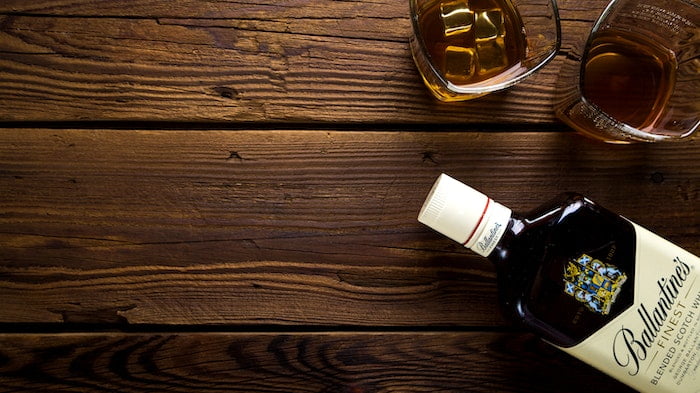
A whisky bottle and two glasses
But if high-risk drinking is that prevalent in Lincolnshire and the wider community, then how do we spot a drug or alcohol addiction?
A drug or alcohol addiction is a disorder. That means it’s classed as a health condition, and like other health conditions, there are symptoms you can look out for.
Some common signs of alcohol addiction include:
- Drinking at earlier times of the day
- Drinking in unexpected locations (such as in public places or at work)
- Drinking an increased amount
- ‘Snowball drinking – where one drink always leads to another
- Continuing to drink despite negative effects on physical health
- Continuing to drink despite negative effects on mental health
- Tension in personal relationships related to your alcohol consumption
- Tension or reduced performance at work related to your alcohol consumption
- Sudden changes in behaviour
- Changes in social life – becoming withdrawn or suddenly spending time with new groups of people
If you use alcohol continually for three months or more, a doctor could diagnose you with an addiction. [3]
What Impact Can Drug and Alcohol Addictions Have on Families?
Like other health conditions and family events, drug and alcohol addictions can take a toll on families.
Addictions have a ripple effect and frequently impact relationships and family dynamics, particularly on children.
Research suggests that children who grow up around individuals struggling with drug or alcohol addiction have an increased risk of developing emotional and psychological disorders or even addiction themselves. [4]
A report from Public Health England recorded that 59% of adults in treatment for drug and alcohol addiction in Lincolnshire and near Lincolnshire were parents or lived with children. [5]
Studies have also drawn a link between addiction and marital violence. [6]
Will I Need a Medically Assisted Drug or Alcohol Detox at Rehab in Lincolnshire or near Lincolnshire?
A medically assisted detox is a method of treating drug and alcohol addiction, particularly in the initial stages of recovery.
A detox is a way of helping your body adjust to living without substances in the system.
A medically assisted detox is where medications are used to help your body make these adjustments by helping to regulate drug and alcohol withdrawal symptoms.
The medications administered are legal, prescribed medications that will be regulated by medical professionals at drug and alcohol rehab in Lincolnshire.
Researchers suggest that medically assisted detoxes are linked to ‘optimum treatment’ outcomes. [7]
For this reason, medically assisted detox treatment is available at drug and alcohol rehab centres in Lincolnshire and across the UK.
What is Drug and Alcohol Rehab in Lincolnshire or near Lincolnshire Like?

Man speaking to a therapist at a residential drug and alcohol rehab in Lincolnshire
Rehabilitation is the name for a course of professional treatment used to help people return to better health.
You can have rehab for an injury, for example, or after having a stroke. The purpose of rehabilitation is to give you the support you need to restore health and increase well-being, to ‘improve function and minimise impairment.’ [8]
Addiction rehab is no different.
With the aim of helping you overcome the difficulties of addiction, drug and alcohol rehab is designed to assist you to get back to how things were before your drug and alcohol addiction started to get out of control.
Drug and alcohol rehab aims to offer you a space to focus on getting better in the short term, as well as providing you with a toolkit to help you stay sober in the long term.
Types of Addictions Treated At Drug Rehab & Alcohol Rehab in Lincolnshire and near Lincolnshire
When people think of addiction, their first thought is usually about drugs or alcohol.
These are known as substance addictions.
- Alcohol addiction
- Benzodiazepine addiction
- Cannabis addiction
- Cocaine addiction
- Crack Cocaine addiction
- Heroin addiction
- Methadone addiction
- Tramadol addiction
- Valium addiction
- Zolpidem addiction [9]
- Compulsive eating
- Compulsive gambling
- Compulsive gaming
- Compulsive spending/ shopping
- Sex and love addiction [10]
Residential Vs. Outpatient Drug and Alcohol Rehab in Lincolnshire & near Lincolnshire – Which is Better?

Staff member sat at a computer in an office at a drug and alcohol rehab in Lincolnshire
Inpatient drug and alcohol rehab is typically what people think of when they imagine rehab.
However, it is not the only form of drug and alcohol addiction treatment, and many people find success with outpatient drug and alcohol rehab in Lincolnshire.
But which form of drug and alcohol rehab is better?
There is no right or wrong answer here – the deciding factor should be you and your personal needs.
However, here are some of the benefits of both forms of drug and alcohol rehab treatment in Lincolnshire to help you choose:
Pros of residential drug and alcohol rehab:
- Less distractions whilst living in a drug and alcohol rehab means more time to focus on your recovery
- The controlled environment of a drug and alcohol rehab in Lincolnshire can provide you with a break from external stressors
- The social aspect of drug and alcohol rehab allows you to meet and connect with individuals in similar situations
- Access to round-the-clock drug and alcohol rehab care
Pros of outpatient drug and alcohol rehab:
- Staying at home in Lincolnshire means you can stay closer to family and friends
- It may be easier to continue to work or study if needed
- You do not need to adjust to a new living environment, like you would at a drug and alcohol rehab in Lincolnshire
- The adjustment period after drug and alcohol rehab treatment will not be as tricky
How Effective is Drug Rehab & Alcohol Rehab in Lincolnshire & near Lincolnshire at Treating Alcohol or Drug Addictions?
There is no size fits all. Everyone will experience addiction in a slightly different way, and that means that the way that treatment works for them will be different too.
On average, though, between 40 and 60% of people will experience relapse. [11]
This is why it is sadly not uncommon for people to go to drug and alcohol rehab in Lincolnshire more than once.
This doesn’t mean that these people have failed, but that they may need some more support in difficult periods when life gets a bit trickier.
Will Drug and Alcohol Rehab in Lincolnshire and near Lincolnshire Cure Me of My Addiction?
Addiction cannot be cured. Like most other chronic diseases though, it can be managed through appropriate treatment. [12]
What Are the Benefits of Alcohol Rehab in Lincolnshire?
Alcohol rehab in Lincolnshire can significantly reduce risk for individuals.
This means reducing risk to mental and physical health and lessening the risk of mortality.
It can help to promote abstinence (refraining from using drugs and alcohol completely) and allow people some time to reset.
Rehab is associated with increased well-being and a greater awareness of how to use coping strategies moving forward after rehab in Lincolnshire. [13]
Does Drug Rehab and Alcohol Rehab in Lincolnshire or near Lincolnshire Work for Teens?
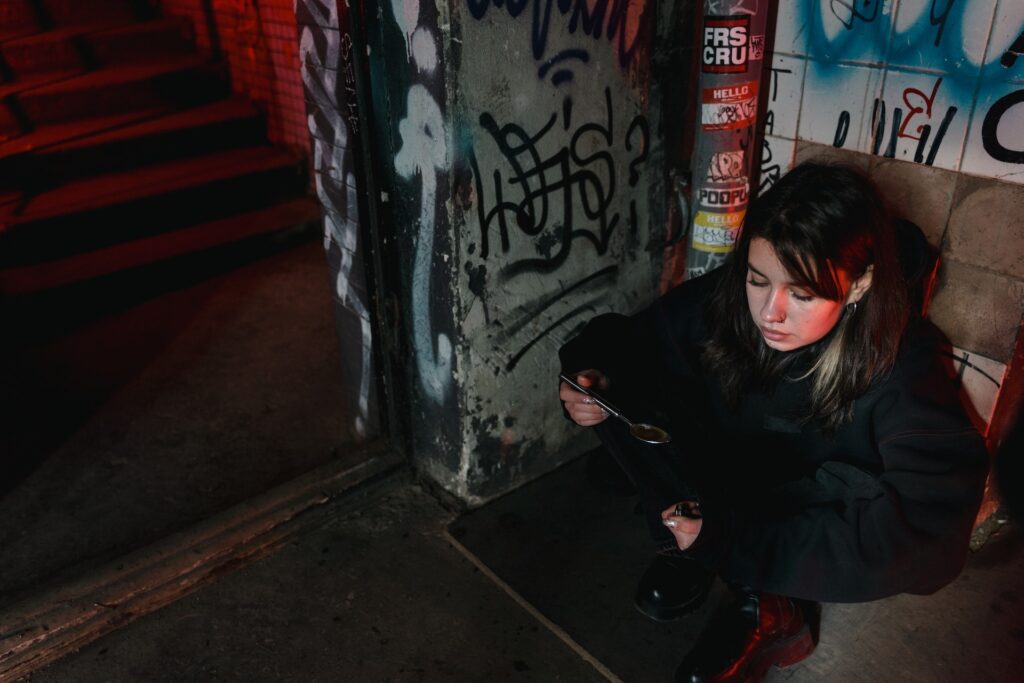
Person crouched down with a spoon of heroin
Addiction is increasingly common in young people.
The most common addictions in young people are to cannabis, codeine, alcohol, cocaine and ecstasy. [14]
Studies show that the sooner addiction is treated, the more likely individuals are to recover. This is especially important in young people, when increased drug and alcohol use is linked to both impaired cognitive function and higher mortality rates. [15]
By getting help at a young age, teenagers can help themselves move forward into adulthood without the repeating patterns of addiction and dependency.
What Percentage of Alcoholics Recover?
Between 40 & 60% of alcoholics experience relapse. [16]
This suggests, on the surface, that the other 40-60% of individuals recover (meaning that they remain sober).
However some people may relapse and then re-enter treatment in Lincolnshire, so the number is not necessarily representative.
What Happens If I Don’t Get Help From A Drug & Alcohol Rehab in Lincolnshire or near Lincolnshire?
Without help, addictions can spiral.
This can mean a myriad of things, including the development of psychological, physical, social and economic difficulties.
These things can all potentially lead to an increased risk of mortality.
This is especially concerning given the Office of National Statistics’ statement that we are seeing ‘the highest levels of drug related deaths since records began.’ [17]
Why Should I Avoid Recovering on My Own in Lincolnshire?
Without professional help, there is an increased risk that you will relapse and also a higher chance of physical health complications.
In 2019-2020, 23.5% more individuals were hospitalised for drug poisoning in the Lincolnshire area. [18]
Specialist services like our rehab centre in Lincolnshire are staffed by industry experts with the research, knowledge, facilities and skills to give you the best chance to move forward towards sobriety
Can I Recover From Addiction Without Professional Help From a Drug and Alcohol Rehab in Lincolnshire?
People who recover from addiction without professional help typically do so through sustained contact with support groups such as Alcoholics or Narcotics Anonymous.
Both of these support groups are available in Lincolnshire and they can be very valuable tools during addiction recovery. However, research suggests that clinical treatment is a more effective tool in maintaining longer term sobriety. [19]
This means that attending rehab and engaging with therapy is the best option to enhance your path to recovery.
What Are the Alternatives to Going to Drug Rehab and Alcohol Rehab in Lincolnshire or near Lincolnshire?

Black and white photo of a therapy group hugging at a drug and alcohol rehab clinic in Lincolnshire
There are other rehabilitation options aside from staying as a resident at a private rehab clinic in Lincolnshire.
It’s useful to speak to one of the Rehab Recovery teams if you’re unsure what the most suitable option is for your treatment needs.
I Can’t Afford Drug Rehab and Alcohol Rehab in Lincolnshire or near Lincolnshire – I Don’t Have Insurance. What Can I Do?
Other options include:
- Attending outpatient drug and alcohol rehab services means living at home but going to your chosen clinic in Lincolnshire for particular therapies, activities, or medications.
- Home detox for those with a physical dependency who are able to remain living at home in Lincolnshire while being in daily contact with a doctor.
- Family support groups such as Al-Anon or AdFam.
- Alcoholics Anonymous, Narcotics Anonymous and Cocaine Anonymous groups follow the 12-step structure.
- SMART Recovery groups for practical support around goal setting and how to achieve those goals.
Whatever help you need – whether from a drug and alcohol rehab in Lincolnshire or from one of these excellent addiction treatment services – give our team a call today on 0800 088 66 86
What is the Admissions Process for Drug Rehab and Alcohol Rehab Like in Lincolnshire or near Lincolnshire?

Therapist taking notes during a group session at a drug and alcohol rehab centre in Lincolnshire
Below we have listed a few of the ways you can be assessed when it comes to being admitted into rehab in Lincolnshire.
The ASAM (American Society of Addiction Medicine) Drug & Alcohol Rehab Assessment
This is a drug and alcohol assessment that is used by psychiatrists at rehab clinics in Lincolnshire to assess addiction.
It’s one that takes into account the whole picture. It focuses on various areas related to the biological, psychological, and social.
Questions that people are asked are in the following areas:
- Your relationship with substance use and how withdrawal affects you.
- Your current and previous psychological health.
- Your current and previous physical health.
- How ready and willing you are to change and heal.
- Your relationship with relapse and how you have managed this in the past.
- What your life and environment is like outside of rehab services.
With all these areas considered it becomes clear to the professional what treatments are going to suit the patient best.
The DSM-5 Drug & Alcohol Rehab Criteria
This is a drug and alcohol assessment that takes on board various aspects of your addiction in order to gain a solid overview of how it’s affecting you. It establishes how severe the addiction is.
This criterion was developed over years and was informed by a wide variety of professionals working in addiction.
Patients discuss the following:
- Whether they have developed a dependency.
- Whether they use despite serious risks.
- How relationships, home, education, and work are affected by use.
- Being unable to stop using.
This assessment can be repeated at various times during the recovery journey to identify how the addiction is evolving.
The AUDIT (Alcohol Use Disorders Identification Test) Drug & Alcohol Rehab Assessment
This drug and alcohol assessment has proven to be highly effective in people all over the world from all different backgrounds. It’s an assessment that focuses on alcohol intake and establishes whether a person has developed a problem.
It might also reveal that a person has developed a dependency.
It’s a multiple question test. Those who score over 8 drink in a way that might be a cause for concern.
Those who score over 13 might have developed a physical dependency.
Questions are based in the following areas:
- How much you drink.
- How often you drink.
- How other people react to your drinking.
- What happens when you drink.
- How you react to your drinking habits.
CAGE Questionnaire at Drug & Alcohol Rehab in Lincolnshire
The CAGE Questionnaire is a series of 4 YES or NO questions. Each YES answer acts as 1 point. The more points you have, the higher the indication that you have an alcohol addiction.
These questions are:
- Have you ever felt you should cut down on your drinking?
- Have people annoyed you by criticizing your drinking?
- Have you ever felt bad or guilty about your drinking?
- Have you ever had a drink first thing in the morning to steady your nerves or get rid of a hangover (eye-opener)?
Begin the admissions process at a drug and alcohol rehab in Lincolnshire today by calling our expert team on 0800 088 66 86
How Can I Convince a Loved One to Access Drug Rehab and Alcohol Rehab in Lincolnshire?

Recovery group talking together at a drug and alcohol rehab in Lincolnshire
Some people with addictions will refuse to accept they have had an addiction for years, despite all the evidence. The way behaviour is affected by the disease also means that the way the person talks and acts can convince the people around them that there isn’t a problem too.
However, there comes a point where the addiction is undeniable. Where the family is able to see this, but the person isn’t, an intervention can be staged.
Usually, a family member or two will meet with a professional and plan how to approach the individual. The aim is to get your loved one to accept the problem and to think about treatment options.
One brilliant way of approaching your loved one as a family is by using the CRAFT intervention method. This method offers a selection of approaches that you identify as being the most appropriate according to which stage of addiction and awareness your loved one is in.
The CRAFT intervention teaches you how to reframe conversations so that it changes the family dynamics. You’re then able to encourage the person to consider local drug and alcohol rehab services. It’s a method that has proven successful throughout the addiction field.
To make sure that your loved one gets the help they need from a drug and alcohol rehab in Lincolnshire by calling us on 0800 088 66 86
How Do I Prepare for Drug Rehab and Alcohol Rehab in Lincolnshire or near Lincolnshire?
Whether you’re attending a local drug and alcohol rehab centre or travelling to attend rehab in Lincolnshire, preparing for rehab can be daunting.
However, there are some steps you can take to make this feel a little less nerve-wracking.
We recommend the following:
- Visit your drug and alcohol rehab centre in Lincolnshire or near Lincolnshire before starting treatment (you can talk to our drug and alcohol rehab admissions team about this)
- Be honest with family and friends about your situation and need for drug or alcohol rehab in Lincolnshire as a way to clear the air
- Set some treatment goals to remind yourself what you are trying to achieve at drug and alcohol rehab in Lincolnshire or near Lincolnshire [20]
- Speak with your employer or staff at your school or univeristy to organise a break in work or studies if needed
- Do some research into addiction treatment to help yourself prepare
How Do I Tell My Family I’m Going to a Drug & Alcohol Rehab in Lincolnshire or near Lincolnshire?

Couple having an argument at a drug rehab and alcohol rehab in Lincolnshire or near Lincolnshire
The media often doesn’t portray drug and alcohol rehab (and addiction in general) in the most positive light.
That can sometimes make it difficult for the people around us to grasp what addiction is actually like. With media promoting misconceptions, there is still some stigma around addiction, and this stigma can make it difficult to talk about. [21]
That being said, having a support network can be a very helpful tool during recovery. For many people, that includes family. Facing addiction alone can feel like a lonely and gruelling endeavour, so speaking to your family about your situation before going to rehab can work to alleviate a lot of this pressure.
There are several ways you could tell your family you are going to drug and alcohol rehab in Lincolnshire, including:
- Writing a letter (this can help you get all of the information across without feeling like you will be interrupted)
- Telling one trusted family member first who can then help you to tell others
- Asking for support from an addiction specialist
- Using a family therapy session to talk about addiction and your journey at a drug nd alcohol rehab in Lincolnshire [22]
Do I Have to Tell My Boss About Drug Rehab and Alcohol Rehab in Lincolnshire or near Lincolnshire?
Whilst you do not have to tell your management anything, it can work in your favour if you do.
This is because if you are seeking treatment for addiction, you will be protected under workplace legislation. This means that your workplace will need to support you in certain ways during your treatment. [23]
If you do not inform your workplace and are struggling at work, this could risk there being an increased tension or confusion at your change in performance that without explanation, could work negatively against you.
Being honest is the best policy, as it will increase your support at work and will typically decrease any concern about your commitment and performance at work.
Will My Insurance Cover Drug and Alcohol Rehab in Lincolnshire or near Lincolnshire?
If you have health insurance, you may be able to access financial support to help cover rehab costs as part of your package.
This will vary between package and provider, so it is best to check this with your insurance provider.
The team at a Lincolnshire drug and alcohol rehab centre will be happy to discuss the fine details of funding treatment with you.
How Long Does Drug and Alcohol Rehab in Lincolnshire or near Lincolnshire Last?
Drug and alcohol rehab is a very personal experience which makes it hard to say for certain how long your treatment will last.
The typical stay in an inpatient drug and alcohol rehab in Lincolnshire is 28 days. [24]
But, this alters between people. Factors that can impact the duration of your drug and alcohol rehab treatment in Lincolnshire include:
- The kind of drug or alcohol rehab treatment you are having in Lincolnshire
- If you are in an inpatient or outpatient drug and alcohol rehab in Lincolnshire or near Lincolnshire
- If your drug and alcohol rehab treatment plan in Lincolnshire includes a detox
- Your personal well-being and potential safety risk whilst at drug and alcohol rehab in Lincolnshire
Can I Force My Loved One to Go to Drug and Alcohol Rehab in Lincolnshire or near Lincolnshire?

Intervention being held for a drug rehab and alcohol rehab centre in Lincolnshire or near Lincolnshire
Unless your loved one is sectioned (meaning they are detained under the Mental Health Act) they cannot be forced to go to drug and alcohol rehab.
This is down to a few things, but mainly boils down to human rights and an individual’s willingness to engage with treatment.
Research indicates that rehab is successful when people are ready to access it. If individuals do not feel that they need help with their addiction, it is not very likely that drug and alcohol rehab will help, as addiction treatment is something that requires commitment and effort. [25]
If you feel a loved one needs support from a drug and alcohol rehab, you can potentially arrange an intervention with them. This is an in-between step that can help individuals recognise that the may benefit from support at a centre like our facilities in Lincolnshire.
What Happens When I Arrive At Drug & Alcohol Rehab in Lincolnshire or near Lincolnshire?
When you arrive at drug and alcohol rehab in Lincolnshire, you will meet your treatment team.
You will be given a tour of the centre and will be given some more information about the site and what your personal treatment plan will look like. [26]
You will have what is called an admissions interview to make sure that all your needs in drug and alcohol rehab will be catered for.
After this, your drug or alcohol rehab treatment can officially start.
Will I Be Able to See My Family During Drug and Alcohol Rehab in Lincolnshire or near Lincolnshire?

Family discussing alcohol addiction at a residential drug rehab and alcohol rehab in Lincolnshire or near Lincolnshire
You will be able to receive visitors at many of our partner drug and alcohol rehab centres in Lincolnshire.
However, it is advised that you do not have visitors too early into treatment as for many people this can increase their homesickness and make it difficult for them to concentrate during the early stages of drug and alcohol rehab. [27]
You can talk to your care team about visiting on-site, and will also be given the opportunity to integrate family visits into therapeutic activities, with the chance to engage with family therapy is appropriate.
Can I Leave Drug & Alcohol Rehab in Lincolnshire or near Lincolnshire At Any Time?
Unless you are under a section or under arrest, no one can stop you from leaving drug and alcohol rehab.
However, it is recommended that you do not leave rehab too early (or too frequently) as doing so can work to negate some of the benefits of a structured rehab programme.
Will My Drug & Alcohol Rehab Programme Be Confidential?
At our rehab centres in Lincolnshire and across the country, we are proud to be guided by high standards of professionalism and UK legislation.
Under data protection laws your information is protected and will not be shared with others outside of your treatment team unless:
- You have disclosed that you are at risk
- You have disclosed that others are at risk
- You have agreed for the information to be shared [28]
Can I Do an Alcohol Detox at Home in Lincolnshire or near Lincolnshire Instead of at Drug & Alcohol Rehab?

Woman sat in thought at a drug and alcohol rehab centre in Lincolnshire or near Lincolnshire
It is possible to have an alcohol detox at home instead of at a drug and alcohol rehab in Lincolnshire.
This is known as ‘home detoxing’ and is something we offer support for in certain cases.
However, home detoxes are not recommended for everyone, as they can pose potential health risks for different reasons.
For some people, however, detoxing from alcohol at home can be an ideal option.
For this reason suitability for home-based detox will be assessed from person to person based on your specific situation. [29]
Is Detox With No Drug Rehab & Alcohol Rehab in Lincolnshire Possible?
It is possible to have a detox without attending or staying in drug and alcohol rehab afterwards, however this is not recommended.
Whilst this may be suitable for some people, detox-only treatment is not usually suggested as it only deals with one part of addiction – the physical component.
As most addictions are a mix of physical and psychological factors, detox-only treatment leaves the psychological side of things untreated, which can then reduce the risk of relapse later down the line. [31]
What Happens at Drug & Alcohol Rehab in Lincolnshire After Initial Detoxification?
After detoxing, you may find that you feel unwell.
During this period you will be closely monitored by a clinical team in one of our Lincolnshire centres to ensure that you are stable and healthy.
You may be prescribed medication to help you feel more comfortable.
When the withdrawals start to abate, then you can move onto the second stage of drug and alcohol rehab, which is the therapy side of things. [32]
What Happens in a 28-Day Drug and Alcohol Rehab Programme in Lincolnshire or near Lincolnshire?
If your treatment requires a detox phase, then your treatment programme will begin with that.
After that you will be able to access the wide range of psychological therapies we offer in our centres in Lincolnshire, including:
- Acceptance and commitment therapy (ACT)
- Addiction Counselling
- Brief Interventions
- Cognitive Behavioural Therapy (CBT)
- Dialectical Behavioural Therapy (DBT)
- Family therapy
- Holistic Therapies
- Group therapy
- 1-1 Therapy
- Mindfulness
- Motivational Enhancement
- Motivational Interviewing
How Much Will a Private Alcohol and Drug Rehab in Lincolnshire or near Lincolnshire Cost?

Couple hugging in a field after a stay at a drug and alcohol rehab in Lincolnshire or near Lincolnshire
To go to a drug and alcohol rehab in Lincolnshire prices can start at around £2,000. The specific drug and alcohol rehab clinic, length of stay, treatments you receive, and whether you share a bedroom all affect the overall cost.
If you require detox, you’ll need to stay around 10 days. To have a room of your own, it would cost about £3,000-£6,000. For a shared bedroom, it would cost around £2,000-£4,000.
The majority of people will require a 28-day stay. For a room for yourself, it costs around £8,000-£12,000. However, if you’re happy to share, it costs around £6,000.
Some people might opt for home detox to wean off a substance that has created a dependency. This is where a doctor will be in regular daily contact with the patient in order to provide prescription drugs and monitor their safety.
This costs around £1,500.
For a more accurate estimation of how much your time at a drug and alcohol rehab in Lincolnshire is likely to cost, call us today on 0800 088 66 86
What to Consider When Choosing a Drug and Alcohol Rehab in Lincolnshire or near Lincolnshire

Therapist speaking with a group at a drug rehab and alcohol rehab centre in Lincolnshire or near Lincolnshire
Addiction is not considered a ‘choice’ or ‘moral failing’ on behalf of the addiction sufferer – so the focus of rehab is always on treating the disease of addiction.
With all the private rehab options in the Lincolnshire area, you might feel a little overwhelmed as to which is going to suit your personality and treatment needs better.
With that in mind, there are a few things you can ask yourself while looking into the various clinics.
Here are some ideas of what you should consider when doing your research:
- How long the drug and alcohol rehab clinic in Lincolnshire has been up and running for and what their reputation is.
- Have a look at reviews of the drug and alcohol rehab clinic in Lincolnshire and see what previous residents have said about the services offered.
- Call the drug and alcohol rehab clinics in Lincolnshire and have a chat with someone there, ask questions, you’ll get a feel for the one which “speaks” to you the most.
- Find out whether the drug and alcohol rehab clinic in Lincolnshire focuses more on therapeutic treatments or 12-step approaches.
- Find out how much the various drug and alcohol rehab clinics in Lincolnshire charge to stay at for various lengths of time and compare – see which fit into your budget.
- Find out what their success rates are like in supporting previous residents to become sober in the long term.
For help choosing the right rehab clinic in Lincolnshire, call our expert team today on 0800 088 66 86
What Happens During Drug and Alcohol Detox at Rehab in Lincolnshire or near Lincolnshire?

Patient meditating at a drug and alcohol rehab clinic in Lincolnshire or near Lincolnshire
Firstly, drug or alcohol detox is only necessary for those who have developed physical dependencies on certain substances. A dependency can develop when people use alcohol, heroin, or benzodiazepines regularly.
These are substances that change how the body functions.
Therefore, when the substance leaves the body, it starts to malfunction and be really dangerous.
This is why a medically overseen detox is essential. A doctor will oversee the process, manage the withdrawal process by prescribing necessary medications, and keep the patient safe from harm and associated risks.
How Long Does a Detox Last at Drug Rehab and Alcohol Rehab in Lincolnshire or near Lincolnshire?
An alcohol or drug detox will usually last between 7-10 days, depending on the substance and severity of the dependency. Alcohol detox will last around 10 days and will require the prescription drug Librium in order to manage the alcohol withdrawal symptoms.
Further drug or alcohol rehab treatment is usually essential in order to overcome the addiction, however. It’s through the psychotherapies that follow that healing begins to take place.
Make sure that your detox is safe and effective with the help of a drug and alcohol rehab in Lincolnshire by calling us on 0800 088 66 86
Do I Need a Detox Programme/Alcohol Withdrawal Treatment in Lincolnshire?
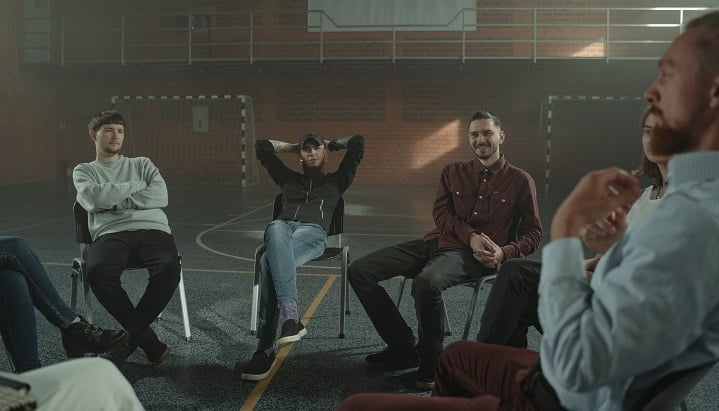
Alcohol support group smiling together at a drug rehab and alcohol rehab centre in Lincolnshire or near Lincolnshire
Really, it’s best to speak with a professional to ascertain whether a detox is necessary.
You can speak with the Rehab Recovery team or have a conversation with your local GP.
However, if you ever experience the following drug or alcohol withdrawal symptoms, it’s likely you need a detox:
- Moodiness and mood swings
- Insomnia
- Anxiety and paranoia
- Shaking and sweating
- Nausea and vomiting
- Diarrhoea
- Hallucinations
- Seizures
Complications from long-term substance abuse can include alcohol withdrawal syndrome, hepatitis and more. For physical dependence on substances, you will likely need a medically-assisted detox. For alcohol, you will probably be prescribed a drug like Chlordiazepoxide for the effects.
At rehab you will learn new and healthy coping mechanisms to help you on your road to recovery. Additionally, you will have access to person-centred care and will be able to find information about sober living houses if needed once you leave.
Not sure whether or not you need a detox? Talk it over with our expert team by calling us today on 0800 088 66 86
How Long will I Have to Stay at a Drug and Alcohol Rehab in Lincolnshire or near Lincolnshire?
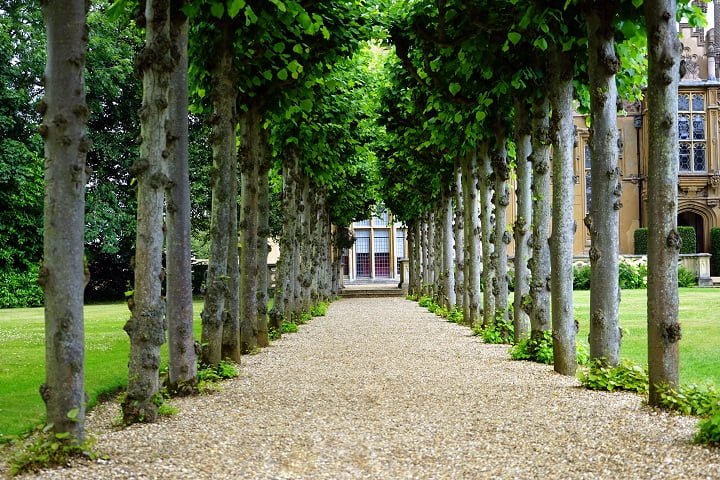
Outside photo of a drug and alcohol rehab
If you’re having a detox, you’ll stay at rehab for at least 7-10 days.
You’ll then need to go on to have other therapies.
Those who don’t have physical dependencies will have therapeutic and alternative therapies.
The psychological input includes psychotherapies, alternative therapies, and relaxing activities. These focus on understanding what caused your addiction and what you can do to change your habits and your life going forward. It takes 3-4 weeks for these treatments to really solidify.
It’s therefore standard for a person to stay at rehab for around 28 days.
To find out how long your stay at a drug and alcohol rehab in Lincolnshire is likely to last, call us today on 0800 088 66 86
Cocaine Treatment at Drug & Alcohol Rehab in Lincolnshire & near Lincolnshire

Couple holding hands together at a drug and alcohol rehab clinic in Lincolnshire or near Lincolnshire
Cocaine use is currently rife throughout the world due to how accessible it’s become. Both the availability and price mean that more people are experimenting. This obviously leads to an increase in cocaine addiction, which can sometimes move on to creating a crack cocaine addiction.
Many parts of the body are affected by this type of addiction: the liver, heart, lungs, and of course, sniffing cocaine famously erodes nose cartilage and rots the gums which mean people’s teeth can fall out. As well as this, cocaine is likely to cause anxiety and paranoia.
At rehab, cocaine users are supported to adapt their behaviours through participating in cognitive behavioural therapy.
This focuses on how to tackle behaviour in a practical way by addressing the thoughts that lead to the behaviour.
There is also a lot of work focused on how to create long-term lifestyle changes.
Because it is not a physically addictive substance, cocaine detox is not needed.
Overcome your cocaine addiction with the support of a drug and alcohol rehab in Lincolnshire – call us today on 0800 088 66 86
Heroin Treatment at Drug & Alcohol Rehab in Lincolnshire & near Lincolnshire

Two people holding a sapling at a drug and alcohol rehab in Lincolnshire or near Lincolnshire
For heroin users, there are two phases of treatment. As mentioned already, heroin causes physical dependency. As such, both heroin detox and psychotherapies are required.
Therefore, the first 7 days or so of a residential rehab stay is focused on heroin withdrawal and detox under the care of a doctor. Subutex is likely to be prescribed in order to wean the person off heroin.
Once detox has been achieved, the focus turns to mental healing. The patient will work with therapists to understand how they reached the point of becoming addicted.
Heroin is used to suppress pain.
This for many users is also associated with suppressing deep emotional pain. In this case, dialectical behavioural therapy might be offered.
Overcome your heroin addiction with the support of a drug and alcohol rehab in Lincolnshire – call us today on 0800 088 66 86
Cannabis Treatment at Drug & Alcohol Rehab in Lincolnshire & near Lincolnshire

Two people having a serious conversation at a drug and alcohol rehab in Lincolnshire or near Lincolnshire
Cannabis use is glamorised on TV. There are also conflicting messages about its usefulness as a medicinal product.
The difference is that in the medical field the strain being used, the dosage, and how it’s administered are all monitored and regulated. This creates a huge difference in how people are affected.
Illegally used cannabis is often very high in the chemical THC, which is the psychoactive ingredient that creates the sensation of a “high”. This is also the chemical that can cause psychosis, anxiety and paranoia.
At cannabis rehab, patients are treated through psychotherapies in order to overcome their triggers. There’s also an emphasis on how to build a life without cannabis using the techniques used in alternative therapies.
Cannabis detox is never required at drug and alcohol rehab, as it is not a physically addictive substance.
At drug and alcohol rehab in Lincolnshire, you can be treated for a range of addictions including substance use disorder, opioid use disorder (Buprenorphine), gambling addiction, ketamine addiction, codependency, cocaine dependence, cannabis use disorder, binge drinking, behavioural addictions and more.
We also help with mental health conditions such as post traumatic stress disorder (PTSD), bipolar disorder, obsessive compulsive disorder (OCD), eating disorders and more.
Overcome your cannabis addiction with the support of a drug and alcohol rehab in Lincolnshire – call us today on 0800 088 66 86
The Treatments Offered at Drug & Alcohol Rehab in Lincolnshire or near Lincolnshire
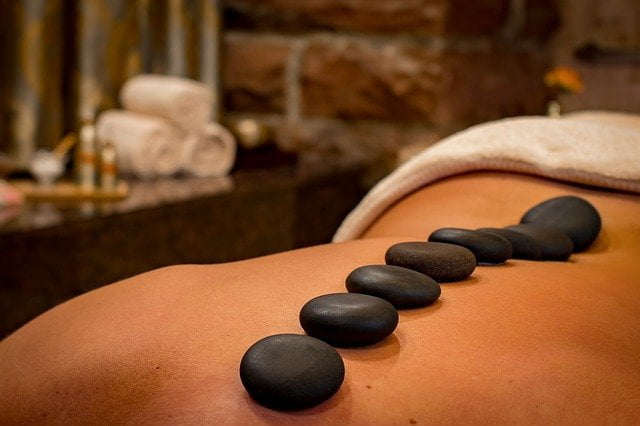
Person receiving a hot stone massage during holistic therapy at a drug and alcohol rehab in Lincolnshire or near Lincolnshire
Drug and alcohol rehab centres in Lincolnshire offer a huge variety of treatments. Rehab staff specialise in different areas linked to physical, psychological and social healing.
As a team, they form a structure of support for you to build your recovery around and provide a comprehensive foundation to help you maintain your sobriety after your time at drug and alcohol rehab in Lincolnshire has ended.
Treatments include:
- Cognitive Behavioural Therapy aims to alter your behaviour by enabling you to catch your thoughts and reframe them, giving you greater understanding of and control over your actions both within and outside of drug and alcohol rehab in Lincolnshire.
- Dialectical Behavioural Therapy aims to alter behaviour by adjusting your emotional responses, helping you to better grasp relapse prevention strategies and avoid triggers when you leave drug and alcohol rehab in Lincolnshire.
- Motivational Interviewing supports you in building self-confidence and resilience. Both are required for a drug or alcohol rehab recovery to be successful, and this often comes alongside Motivational Enhancement Therapy.
- Individual therapy sessions for you to share and explore your feelings around particular events and people, speaking with a specialised drug and alcohol rehab therapist to help you come to terms with your addiction and move beyond it.
- Group therapy sessions with a 12 Step framework that enables and guides recovery through social connection and the acceptance of addiction as an illness, introducing you to social support networks that can be essential in maintaining sobriety after drug and alcohol rehab in Lincolnshire.
- Group therapy sessions with a SMART framework that teach you how to create small, achievable goals that support recovery.
- Yoga, meditation and mindfulness in order to support you to relax and unwind while finding inner peace.
- Art therapy and music therapy so that you can begin to express your experiences and feelings in new ways. These are especially useful for people who find it hard to put thoughts into words.
Other types of therapy available at drug and alcohol rehab include Contingency Management, Rational Emotive Behavior Therapy, Motivational Enhancement Therapy, Family Therapy, Eye Movement Desensitization and Reprocessing, Equine Therapy, Drama Therapy, Acceptance and Commitment Therapy and many other forms of psychiatric treatment.
Experience any and all of these effective addiction treatments at a drug and alcohol rehab in Lincolnshire by calling us today on 0800 088 66 86
Aftercare After Drug & Alcohol Rehab in Lincolnshire or near Lincolnshire

Patient taking notes outside at a drug and alcohol rehab in Lincolnshire or near Lincolnshire
When you go to a drug and alcohol rehab in Lincolnshire, you’ll reach a point where it’s necessary to begin developing a relapse prevention plan. The staff will lead you through discussions about your internal and external triggers and you’ll come up with ideas on how to manage these.
This plan will form a key part of your aftercare journey.
There will also be actions for you to take in order to build a meaningful life beginning new activities that you enjoy.
Staff are also likely to use the HALT relapse prevention method to create your recovery plan. This is where you discuss halting when you feel Hungry, Angry, Lonely, or Tired.
Hunger is referred to in the metaphorical sense. People often feel hungry to develop themselves or to find spiritual meaning in life, for instance. All of these human states can be triggering.
A discussion with rehab staff will support you to understand what circumstances are likely to trigger you into these HALT states. You’ll then focus on “halting” and working through a list of steps to take which thereafter effectively manage your trigger point.
For instance, if you felt angry you might relapse by returning to your coping mechanism, alcohol. However, with HALT, you might have a plan to firstly, breathe, then call a particular person before going to a different place in order to change your mood and manage your anger response.
Match your time at a drug and alcohol rehab in Lincolnshire with an equally effective relapse prevention plan by calling us today on 0800 088 66 86
What Happens After Drug & Alcohol Rehab in Lincolnshire or near Lincolnshire?
After rehab you will leave formal treatment – but that does not mean that your recovery suddenly stops.
In actual fact, many people see the post-rehab stage as the time where a lot more work takes place.
After rehab you can engage with aftercare. This can either take place at our centres in Lincolnshire, or in your local community.
This can be a very crucial step in recovery where you start to return to your daily life with a new set of skills to help you maintain sobriety moving forward.
How Long Does Aftercare After Drug and Alcohol Rehab in Lincolnshire or near Lincolnshire Last?
Just like the main treatment, aftercare is a personal experience.
That means that the time you spend in aftercare will depend on how you feel.
Some people engage with aftercare for a few months and then feel that they are ready and have the tools they need to move on without it.
Others might stay in aftercare for years, engaging with support groups in the Lincolnshire community as a way to stay in active recovery. [33]
How Will I Sustain My Sobriety Once I Leave Drug and Alcohol Rehab in Lincolnshire or near Lincolnshire?
Anxiety about how to stay sober ‘out in the real world’ is a big concern for many people.
During your time in our rehab centres (either in Lincolnshire or across the country) in some senses, it is easier to stay sober as you give your full attention to your recovery.
After rehab though, you will return to daily life and will need to navigate difficult situations and your usual routine whilst also keeping on top of the recovery skills you have learnt.
This means that it can take some more effort to stay sober when you leave rehab – but that doesn’t mean that it is impossible.
Some of the ways you can stay sober include:
- Engaging with aftercare after drug and alcohol rehab in Lincolnshire
- Attending support groups nearby in Lincolnshire or online
- Considering staying in a sober living house in Lincolnshire [34]
- Staying in touch with peers in Lincolnshire or elsewhere who are also in active recovery from drug or alcohol addiction
- Staying in therapy long-term through outpatient drug and alcohol rehab in Lincolnshire or other therapy services
Narcotics Anonymous in Lincolnshire & near Lincolnshire
Narcotics Anonymous (also referred to as NA or NAR-Anon) is a support group ran by individuals with lived experience with addiction to narcotics to help people struggling with addiction to recover, or to stay clean.
It is typically ran through group meetings (there are meetings in Lincolnshire) but can also be accessed through online forums and the NA website. [35]
Alcoholics Anonymous in Lincolnshire & near Lincolnshire
Alcoholics Anonymous (also referred to as AA) is a support group ran by individuals with lived experience with a history with alcoholism to help people struggling with addiction to recover, or to help them stay sober
It is typically ran through group meetings (there are meetings in Lincolnshire) but can also be accessed through online forums and the AA website. [36]
SMART Recovery in Lincolnshire & near Lincolnshire
SMART recovery is a self-help programme of support that aims to help people struggling with addiction through offering help with:
- Building and maintaining motivation
- Coping with urges
- Managing thoughts feelings and behaviours
- Living a balanced life [37]
SMART recovery aims to provide individuals with a toolkit they can use in daily efforts to stay sober and clean.
How Can I Refer Myself to Drug & Alcohol Rehab in Lincolnshire or near Lincolnshire With Rehab Recovery?

Woman typing on a phone at a drug and alcohol rehab in Lincolnshire or near Lincolnshire
Get the support you need to overcome your drug or alcohol addiction with the help of a drug and alcohol rehab centre in Lincolnshire or near Lincolnshire.
Many drug and alcohol rehab clinics operate throughout Lincolnshire and nearby, offering inpatient or outpatient treatment, private and public services, and many diverse and effective treatment methods.
Every rehab in England and Wales that we work with is vetted by the Care Quality Commission. We also follow guidelines set by the National Institute for Health and Care Excellence.
Get help for addiction anywhere in Lincolnshire or near Lincolnshire, including in Lincoln, Grimsby, Scunthorpe, Grantham, Boston, Cleethorpes, Spalding, Skegness, Gainsborough, Stamford, Sleaford, Louth, North Hykeham, Bourne, Market Deeping, Mablethorpe, Barton-upon-Umber, Immingham, Holbeach, Horncastle, Brigg, Washingborough, Waltham and many others.
Start your recovery journey at a drug and alcohol rehab in Lincolnshire today by calling our expert team on 0800 088 66 86
References for Drug Rehab & Alcohol Rehab in Lincolnshire & Near Lincolnshire
[3] https://www.drinkaware.co.uk/facts/health-effects-of-alcohol/mental-health/alcoholism
[4] https://www.ncbi.nlm.nih.gov/pmc/articles/PMC3725219/
[6] https://www.ncbi.nlm.nih.gov/pmc/articles/PMC6986502/
[10] https://www.ncbi.nlm.nih.gov/pmc/articles/PMC3164585/
[11] https://nida.nih.gov/publications/drugs-brains-behavior-science-addiction/treatment-recovery
[12] https://substanceabusepolicy.biomedcentral.com/articles/10.1186/1747-597X-6-28
[15] https://www.ncbi.nlm.nih.gov/pmc/articles/PMC7732345/
[16] https://nida.nih.gov/publications/drugs-brains-behavior-science-addiction/treatment-recovery
[19] https://nida.nih.gov/publications/drugs-brains-behavior-science-addiction/treatment-recovery
[20] https://www.ncbi.nlm.nih.gov/books/NBK235499/
[21] https://www.ncbi.nlm.nih.gov/pmc/articles/PMC5854406/
[22] https://www.ncbi.nlm.nih.gov/books/NBK571088/
[23] https://www.unison.org.uk/get-help/knowledge/health-and-safety/alcohol-drugs-and-substance-abuse/
[24] https://www.ncbi.nlm.nih.gov/books/NBK64815/
[25] https://www.ncbi.nlm.nih.gov/pmc/articles/PMC4577236/
[26] https://www.ncbi.nlm.nih.gov/pmc/articles/PMC4695774/
[29] https://www.ncbi.nlm.nih.gov/pmc/articles/PMC6299173/
[30] https://www.ncbi.nlm.nih.gov/books/NBK590034/
[31] https://www.ncbi.nlm.nih.gov/pmc/articles/PMC5993892/
[32] https://www.ncbi.nlm.nih.gov/pmc/articles/PMC8863854/
[33] https://substanceabusepolicy.biomedcentral.com/articles/10.1186/s13011-020-00281-7
[34] https://www.ncbi.nlm.nih.gov/pmc/articles/PMC3057870/
[35] https://ukna.org/


